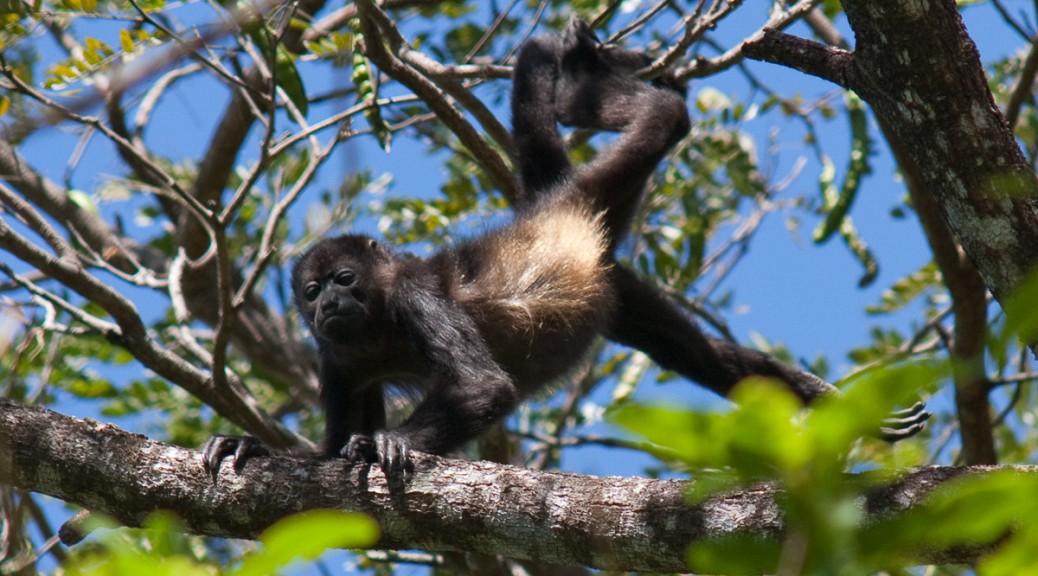[Image: A howler monkey swings from a tree branch.]
Today’s Wikpedia Signpost newsletter featured an article that focused on my particular areas of interest enough that I wanted to blog about it immediately. The animal rights organization PETA has filed a lawsuit to grant the copyright for a selfie taken by a monkey, Naruto, to the monkey himself. This lawsuit follows an attempt by the human photographer, David Slater, to have the series of photos removed from Wikimedia, on the grounds that he owned the rights to them. The Wikimedia Foundation countered that the works were not covered by copyright law as they were not created by a human being; the U.S. Copyright Office agreed.
While most would be tempted to just laugh this all off as “ridiculous story of the week,” I’m both a photographer and animal rights activist, so I see several separate issues of interest here. I should begin by disclosing that I’m no fan of PETA; as I’ve blogged previously, I’ve found much of their messaging sexist, racist, and problematic in many other ways.
But what intrigues me about PETA’s lawsuit is the position that I’ve taken myself, that animals are people, not property. As I discussed in the linked post, however, being a person is not equivalent to being a citizen, with all the rights and privileges granted to a human resident of a particular political jurisdiction. Recognizing the personhood of non-human animals does not entail granting them equivalent legal status to humans in all areas, only in those which are meaningful in the context of living out their lives freely.
One would be hard-pressed to say that a wild animal taking a photograph, under highly-contrived circumstances arranged by a human, would have any legitimate interest in claiming legal ownership of their work. The original purpose of copyright, before greedy corporations like Disney and Warner/Chappell corrupted it, was to encourage artists to create new works by granting them exclusive rights for a limited period of time. Monkeys do not take photographs of their own accord, nor do they make income by selling prints or licenses.
While it doesn’t make much sense to grant Naruto this copyright, it’s questionable whether the human photographer should be profiting from what might amount to an act of exploitation, from a moral perspective. From a legal perspective, Slater claims he put a great amount of work into setting up the shots, so they should be considered his property.
A related issue came up a few years ago, when a friend posed a hypothetical question: If someone hands their camera to you and asks you to take a photo of them, and you do so, do you now own the rights to that photo? (This situation occurs quite frequently in tourism.) I posted this question to a photography forum, and quite a lively discussion ensued.
My position, as professional photographer (more actively so then than now), was that under United States copyright law, the photographer would own the photo, but it would be petty to try to actually enforce that claim. Others said that you would in essence be acting as a “meat tripod,” and thus had no claim to the work. I countered that as a professional, I would put some effort into framing, adjusting exposure, and the like, so I would actually be putting some work into the photo. (This was before smartphone snapshots became ubiquitous.) But I emphasized that I would never actually try to track down the photo and claim that I owned it.
As an aside, my frustration with the public’s ignorance of copyright law, coupled with my belief that capitalism should ultimately be dismantled, both led to the change in my photography business model. My Creative Commons-licensed photos are still under copyright — another subject the general public doesn’t quite understand — but that’s a topic for another post.
Regardless, we’re not talking about two humans here; we’re talking about a free-living animal who was cajoled by a human into helping create a product that no member of his species is capable of producing on their own, or even comprehending in full. I believe that trying to derive monetary profit from this endeavor is wrong on both PETA’s part and the photographer’s, even though PETA claims they would use 100% of the profits to benefit Naruto and other crested macaques. Animal rights efforts focus far too much on “personable” animals like monkeys and elephants, when the ones who most urgently need attention are the chickens, cows, pigs, and fishes that we slaughter by the tens of billions every year. Granting personhood means recognizing that no animal, regardless of species, should be the property of another.

If Naruto does get determined to own the copyright, wouldn’t he then be entitled to all royalties, not PETA? If PETA is acting as his agent in this matter (highly questionable), then shouldn’t all the funds be used solely to benefit Naruto and not others?
The ambiguities and practicalities of how the royalties would be used is part of why I don’t trust PETA to manage this situation, even if their intentions are sincere.